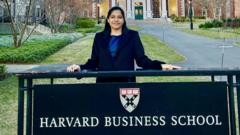As graduation approaches, Shreya Mishra Reddy, a student from India, faces the grim reality of potentially not completing her executive leadership program at Harvard University due to new immigration restrictions. This move, instituted by the Trump administration, aims to halt the enrollment of international students at the prestigious institution, citing non-compliance with federal law as justification. Shreya's admission to Harvard, celebrated with joy by her family, now feels overshadowed by shifting policies that jeopardize her future.
Reddy is one of over 6,800 international students at Harvard, comprising more than 27% of the university's enrollment. This diverse cohort assumes significant financial importance for the institution—approximately a third of whom hail from China, with more than 700 students from India. In response to threats against its status, Harvard has labeled the government's actions as unlawful, potentially setting the stage for a legal battle. However, for students caught in this predicament, the immediate future remains uncertain—with many facing the possibility of needing to transfer to other American universities to maintain their visa status.
The Trump administration's recent crackdown, particularly targeting colleges perceived as sympathetic to pro-Palestinian movements, has sent shockwaves through the international student community. The White House's hostility towards Harvard escalated after it refused to alter its hiring and admission policies, leading to the freezing of nearly $3 billion in federal grants, a move that is also being contested legally by the university.
Among the impacted students is Chinese national Kat Xie, who expressed her shock at the sudden announcement, remarking on the emotional turmoil and mounting pressures faced by her fellow students seeking to remain in the US. Abdullah Shahid Sial from Pakistan articulates the disillusionment experienced by international students, who once viewed the United States as a land of opportunity. He notes a significant change in perception, highlighting a pervasive sense of fear within the community, stemming from recent visa revocations and detentions tied to pro-Palestinian protests.
Many international students, like a South Korean postgraduate, now hesitate to travel home due to fears of being barred from re-entering the US. The anxiety is palpable as students contemplate the implications of these new restrictions on their lives, academic relationships, housing, and community ties. New Zealand's Jiang Fangzhou, a student at the Harvard Kennedy School, echoes these sentiments while expressing concern for incoming students who may have turned down other schools to pursue their dreams at Harvard.
With the situation evolving rapidly, the student body finds themselves in the eye of the storm, grappling with the reality of uncertain futures as discussions about educational policy and immigration unfold at the national level.




















